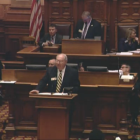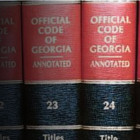
Georgia Juvenile Code Rewrite Suffers Last-Minute Death
|
Lingering questions about the state’s cost for prosecutors and public defenders in juvenile courts scuttled the bill Monday at the 11th hour. House Bill 641, an overhaul of Georgia’s juvenile code for deprived, troubled and delinquent children, remained stuck in the Senate Rules Committee and is not scheduled for a vote before the Legislature adjourns Thursday. Rep. Wendell Willard, sponsor of the bill, did not push for a floor vote after hearing that Gov. Nathan Deal still had budget concerns, said Kirsten Widner, policy director at the Barton Child Law and Policy Center. “As best as we can discern, there are enough funding questions about some of the other priorities from the governor’s platform ... that he felt like he needed to make some tough budget decisions, and something had to give,” Widner said. The governor’s office did not have time, Widner said, to reconcile last-minute disputes about the real cost of the reforms.
“There are such wildly different estimates and they didn’t have the time to get to the bottom of all of that, to work through all the numbers and really understand them,” she said.








